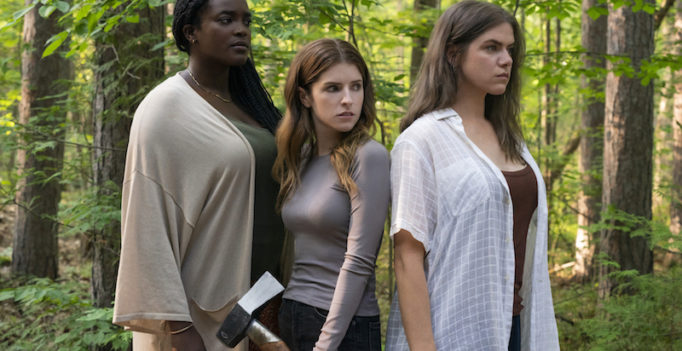Alice, Darling gives audiences just enough insight into its character driven piece for it to be emotionally moving. The emphasis is only there because I also feel like the movie is missing its first act.
Alice (Anna Kendrick) is an all-around sweetheart with a big smile and supportive gal pals (Kaniehtiio Horn, Wunmi Mosaku). She’s also involved in a flawed romance with artist partner Simon (Charlie Carrick). There’s some awkward communication between the lovers, which is linked to psychological domestic abuse with belittling language and intimidation from Simon. Alice, showing meek qualities because of Simon’s actions, can’t help but feel trapped, but she’s also trying to convince herself that Simon’s behaviour is normal. Emotions and epiphanies are exposed during a “girls only” getaway, but only after Alice’s anxiety reveals she’s internalizing her struggle.
Alice, Darling is considerably well directed by Mary Nighy, treating her feature-length debut as a cinematic stage play without feeling too stilted. A well-intentioned confrontation towards the end with plenty of, almost animalistic, protection is the only time the movie feels stagey. Nighy has a good instinctive ability to recognize characters during their quieter moments. Through her vision, audiences receive a personal and respectful view of how inner turmoil can present itself in different ways (such as shortened speech and physical mannerisms). An example of this is when we see Alice distracted by Simon’s inevitable disappointment with her. This is primarily translated through her developing trichotillomania (the obsession of pulling one’s hair out). Nighy faithfully portrays these moments with curiousity and concern. This disorder, as well as other relievers in Alice’s routine, are also performed with compassion by Kendrick. She brings her familiar kindhearted demeanour to the role, and spins it into a persona that’s hiding nerve-racked panic.
Because Alice, Darling is so well handled, I wish Alanna Francis’ screenplay spent more time fleshing out the relationships in Alice’s life. Francis, whose decent writing also felt a bit “off” in The Rest of Us, seems to be focused on the finish line instead of the journey it takes to get there. Her writing keeps improving, but it still feels like she’s scared of getting to know her characters. I really want to encourage Francis (and her frequent story editor Mark Van de Ven) to continue working. Their writing quality is so close to perfection.
**********
Do You Tweet? Follow These Tweeple:
Addison Wylie: @AddisonWylie





Be the first to comment